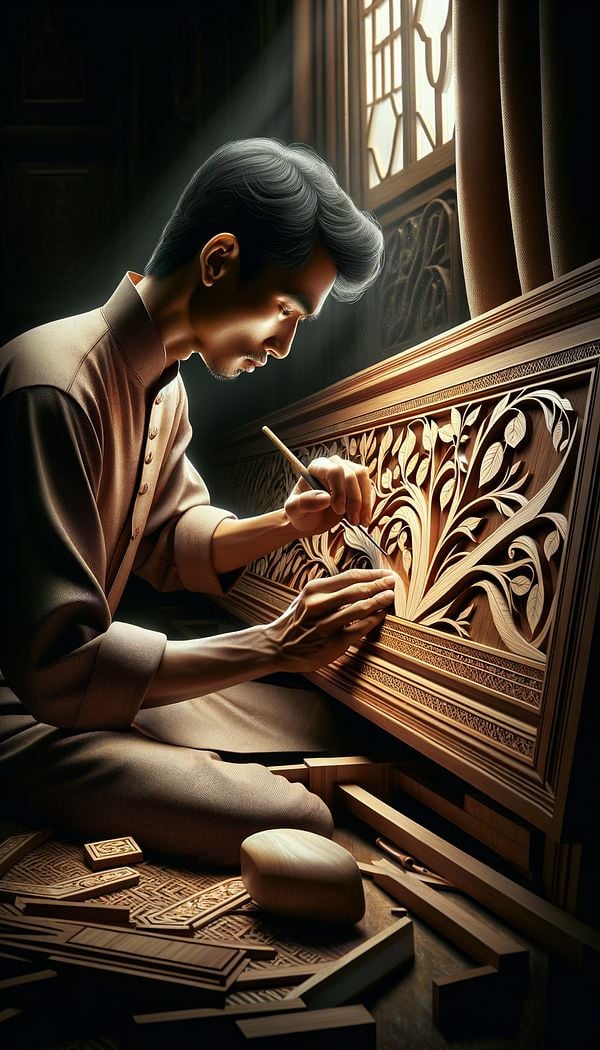What is an Ebeniste?
An ebeniste is a highly skilled cabinetmaker who specializes in the art of fine furniture making.
Description
An ebeniste is a term that hails from French origins, denoting a craftsman deeply versed in the art of creating fine furniture — think of intricate cabinets, detailed marquetry, and exquisite inlays. Unlike ordinary carpenters or cabinetmakers, ebenistes are celebrated for their meticulous attention to detail, their proficiency in working with luxurious materials such as exotic woods, ivory, and metals, and their ability to transform these materials into breathtaking pieces of functional art.
The craft of an ebeniste transcends mere construction; it is deeply embedded in the historical fabric of furniture making, especially noted during the 17th and 18th centuries in France. These artists brought to life the lavishness and intricacy that defined the Baroque and Rococo periods. Their work, which often involved complex joinery techniques, elaborate veneering, and intricate decorative inlays, not only required a high level of technical skill but also an artistic vision.
Today, the term 'ebeniste' continues to inspire and refer to artisans who dedicate themselves to this high level of craftsmanship. Modern ebenistes may blend traditional techniques with contemporary design elements, crafting pieces that pay homage to the past while fitting into the modern household.
Usage
Historically, an ebeniste would have been found in the workshops of the French royal court, crafting elaborate furniture for kings and nobles. Today, ebenistes continue to work in luxury furniture making, whether in preservation of antique pieces or the creation of new, bespoke items that require a high level of skill and detailing. Their work can be found in high-end homes, museums, and galleries, appreciated by those who value the blend of artistry and craftsmanship in furniture.
FAQs
-
How does an ebeniste differ from a standard cabinetmaker?
An ebeniste differs from a standard cabinetmaker in the level of skill and detail involved in their work. Ebenistes specialize in fine furniture making with intricate designs and high-end materials, while standard cabinetmakers may focus on more practical, functional pieces without the elaborate detailing.
-
What materials are commonly used by ebenistes?
Ebenistes commonly work with luxurious materials including exotic woods, such as mahogany and ebony, as well as metals, ivory, and materials suited for marquetry and inlays. The choice of materials often plays a key role in the luxury and uniqueness of their creations.
-
Can modern furniture be considered ebeniste work?
Yes, modern furniture can be considered ebeniste work if it involves the high level of craftsmanship, detail, and use of luxurious materials typical of traditional ebeniste creations. Modern ebenistes may incorporate contemporary designs and techniques, but the essence of their craft remains rooted in the fine art of furniture making.
Practical Application
Whether furnishing a home, looking to invest in timeless pieces, or interested in furniture restoration, seeking out an ebeniste's work is a way to ensure a high level of craftsmanship and artistic quality. Their pieces are not just furniture but works of art, crafted with skills that have been honed over centuries. When considering commissioning a piece, it's essential to discuss your needs and vision with the ebeniste, as their expertise can guide the process to achieve a piece that meets both practical and aesthetic goals.
-
Furniture Types599 articles
-
Decorative Techniques322 articles
-
Historical Periods & Movements150 articles
-
Fabrication & Craftsmanship133 articles
-
Materials & Textiles360 articles
-
Overstuffed FurnitureOverstuffed furniture is a type of plush, heavily padded furniture.
-
NRC - Noise Reduction CoefficientNRC is a standard measure to indicate how much sound an acoustic material can absorb.
-
Bunk BedA bunk bed is a type of bed in which one bed frame is stacked on top of another, allowing two or more beds to occupy the floor space usually required by just one.
-
Mission StyleMission Style refers to a design movement emphasizing simple, sturdy construction with minimal ornamentation.
-
Spoon BackA spoon back is a chair design characterized by a curved, concave backrest that resembles the shape of a spoon.
